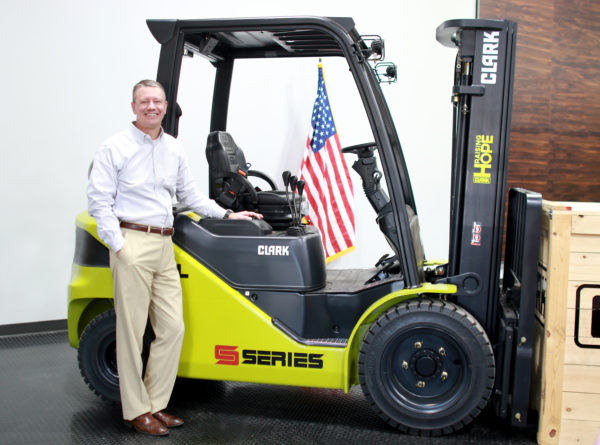 Eileen Mozinski Schmidt
Eileen Mozinski Schmidt Manufacturer and Dealer relationship: Dealers are our ‘key jewel’ at CLARK
700 Enterprise Dr.
Lexington, KY 40510
Phone: 866 252-5275
http://www.clarkmhc.com
A “critical bridge.” This is how Scott Johnson described the dealers who work with CLARK Material Handling Company.
“We believe that the dealer continues to remain the critical bridge between us as the factory and the end user customer,” said Johnson, vice president of sales and marketing for Clark, overseeing the company markets in the U.S., Canada, Mexico and Latin America.
He also currently sits on the Industrial Truck Association Board of Directors as chairman and is a member of the executive committee. He is a participating member of the Material Handling Equipment Distributors Association (MHEDA), according to his online biography.
This month, as Material Handling Wholesaler focuses on the key relationship between dealers and manufacturers in the material handling industry, we spoke with Johnson about how this process works at Clark and what challenges and opportunities are ahead for both parties within this pivotal partnership.
‘Close to the market’
Johnson has been with Clark since 1995 and works in the company’s North American headquarters based in Lexington, Ky.

Scott Johnson
“Just about every task that a dealer would need is coordinated either through this facility or our sister facility in Louisville,” he said. This includes assembly work on Clark’s models of trucks in the production facility and at the headquarters the sales, marketing and engineering services, according to Johnson.
Clark utilizes independent entrepreneurial dealerships for all of its distribution. Johnson said the average tenure of a Clark dealer with the company is about 25 years and so care is taken to ensure terms are accommodating for both parties in a lengthy partnership.
It is a system that works well, he said. “Dealers can do things that it is hard for a manufacturer to do because they are closer to the market than we are. They have a more intimate knowledge of customer wants and needs,” Johnson said. This includes working to solve multifaceted problems, according to Johnson.
“In many cases when a customer is requiring or needing a multi-pronged solution that involves my products but my products may not to be the sole solution, the dealer is able to bring that all together,” he said.
‘Well educated and well connected’
From Johnson’s vantage point, many of today’s dealers are skilled at providing solutions to complex needs.
“There’s really nothing a customer can want for that a dealer can’t coordinate,” he said, naming warehouse management systems, racks, docks and doors, as a few of those areas of expertise.
“An A-level dealer, which is what Clark predominately deals with, those companies are able to provide all of those solutions,” said Johnson, describing the best of current dealers as “well-educated and well-connected” and able to craft multi-tiered platform solutions.
“We have great confidence in our dealers and dealer salespeople. They’re really smart people and they know what they’re doing. They have the ability to use so many different resources,” he said.
Asked whether the wide array of expertise needed to be a successful dealer today also creates a lot of pressure, Johnson agreed. “It used to be that you brought in the lift truck. Now you’re bringing in the lift truck, the rack and some type of warehouse layout,” he said. “Now customers are looking for power solutions in the warehouse. A sales person has to be well-versed in lithium ion, fuel cells, fast charging.”
Dealers are now knowledgeable about such subjects or have someone on staff who is, according to Johnson. “If you’re going to just drop off the quote for the truck, that’s probably not going to get you the deal,” he said.
‘A great business to be in’
Another current challenge is attracting new talent to the industry, on both the manufacturing and dealer sides of the supply chain.
“In today’s world it is more difficult that in the past to find qualified dealers. It’s a challenge for our industry. We don’t have people coming into the industry like we used to,” Johnston said.
Efforts need to continue to attract new talent, he said, noting that MHEDA has several current initiatives designed to help young workers learn about the material handling industry.
“I give kudos to MHEDA,” said Johnson, noting the need for those involved with the industry to spread the message of what it has to offer. “This is a great business where you can make a fair wage. You can see some really neat things, meet some fantastic people. You can apply skills you have learned throughout your life to sell forklifts. It’s a great business to be in,” he said.
‘Lots of positive vibes’
Still Johnson believes, through his role at Clark and as an industry leader, that the outlook for the industry remains strong.
“We’ve had several record years in a row for our industry that bodes well for sales and for everyone, not just Clark,” he said. While such record levels may not necessarily continue in the next few years, Johnson said “predictions are indicative of a very robust industry” in the near future.
At Clark, he said investments in the company’s people, inventory and facilities continues.
Johnson predicted that manufacturing consolidations will slow in the coming years, while there may be more consolidation at the distribution level. He said technological advancements are also ahead. “Technology continues to work its way into our products at the OEM level and distribution level,” said Johnson, adding that fuel types will continue to evolve as well. “It’s exciting times. There are a lot of positive vibes out there,” he said, advising other businesses to stay focused and continue investing in their operations.
Clark is currently working on a variety of new initiatives, including a new three-wheel truck for customers and dealers to begin purchasing in 2020.
‘The key jewel’
The Clark model of manufacturer and dealer relationship is likely to continue long into the future, Johnson said. “I don’t see it changing. We are committed to this distribution model, committed to the independent dealer. We believe that grassroots entrepreneurial perspective is key to our success,” he said.
“I have had the pleasure of working with all of our dealers since ‘95 and Clark would not be what it is today if it wasn’t for our dealers. “To me, it’s the key jewel in the crown.”
Asked whether there are variances across the company’s global dealer network, Johnson said there are some regional differences perhaps in language or sales methodologies or cultural backgrounds. But the “root DNA” is the same.
“There are some core competencies that transcend country lines or languages,” he said, describing how dealers from across his coverage area of North and South America will bond during conferences, like new equipment sales training events.
“For a week these folks are embedded with each other,” he said, saying that by the end of the week, the attendees will have bonded. “They’ve gained respect for each other and the common denominator there is Clark,” he said.
Johnson explained the impact of the company’s dealer network by presenting a hypothetical scenario in which Clark switched to producing an entirely different product. “If I decided tomorrow that we wanted to distribute tablecloths, I could be in the tablecloth business from Tampa to Seattle in about 48 hours,” he said.
“That is the power of the Clark family and the power of a cohesive distribution network.”
Eileen Schmidt is a freelance writer and journalist based in the Greater Milwaukee area. She has written for print and online publications for the past 13 years. Email [email protected] or visit eileenmozinskischmidt.wordpress.com to contact Eileen. If your company would like to be featured, email [email protected]









